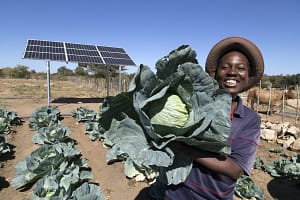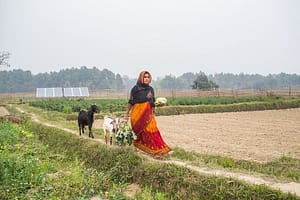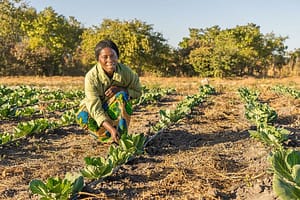
Closing the Gender Data Gap in Agriculture-Food Systems
By Darshini Ravindranath Angel Konthoujam. Gender equality and social equity are integral to achieving sustainable development in agriculture-food systems, however, achieving said goals has been challenging because of the unique complexities associated with it. Gendered power dynamics are frequently visible in middle- and low-income countries which results in women having…

Community Engagement and Capacity-Building needs in Technology Intervention
By Amrita Rauniyar Shisher Shrestha. Climate change is having a global impact on water security and agricultural practices. As a result, there is a need for sustainable agricultural practices (Singh et al., 2024). Boosting agriculture in a changing climate requires climate-resilient technologies that address both adaptation and mitigation measures. Solar…

Impact of SKY: A Perspective of Women Farmers
By Kriti Sharma Deepak Varshney Darshini Ravindranath. The agriculture sector in India, as per the India Energy Outlook, accounts for a staggering 80% of the country’s water demand. Within the total cultivable area, 51% relies on rainfed irrigation while the remaining 49% depends on irrigation systems. Out of the 26…

Grid-connection pilots for IDCOL’s Solar Irrigation program in Bangladesh
By Shisher Shrestha Manish Kumar Bangladesh’s farmers depend on irrigation powered by imported diesel. With the rising cost of fossil fuel, the diesel-powered irrigation system is becoming increasingly unaffordable. According to Bangladesh’s Nationally Determined Contributions (NDCs), the country is committed to reducing Greenhouse Gas (GHG) emissions by 5% (un-conditionally) by…
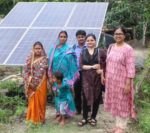
Facilitating SIP Subsidies through Innovative Finance Support Model
By Sunipa Das Gupta SwitchON Foundation, an SDC-IWMI SoLAR innovation fund grantee, is enabling farmers in East and West Midnapore, Nadia, and North 24 Parganas districts of West Bengal to avail of a state government subsidy for SIPs, by facilitating bank loans for them through the Ratnakar Bank Limited (RBL).…
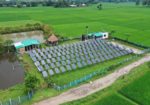
IDCOL in Bangladesh: A Public-Private Partnership (PPP) Model for Decarbonizing Irrigation through Solar
By Archisman Mitra Diesel-based groundwater irrigation has been crucial for Bangladesh’s Boro rice cultivation and subsequent food security. As of 2019, boro accounted for more than half of Bangladesh’s food grain production. However, Bangladesh imports much of its diesel. As a result, it spends roughly $3.2 billion annually on import…
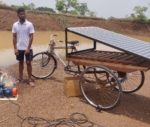
Solar Irrigation for the “Last Mile”
By Shisher Shrestha Kalinga Renewable Energy Manufacturers Pvt. Limited (KARMA), a start-up from the Indian Institute of Technology (IIT) Bhubaneswar, innovates in mobile solar irrigation pumps for small and fragmented landholdings in rural Bihar and Odisha. Due to poor irrigation infrastructure and a lack of reliable electricity grids in…
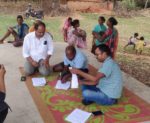
Tapping Surplus Energy from SIPs for post-farmgate use
By Shisher Shrestha Collectives for Integrated Livelihood Initiatives (CInI), a SoLAR IF Grantee based in Rachi, aims to transform the lives of tribal households in the tribal belt of Jharkhand. In the Sardakhel village, Rachi, the local tribal group Munda resides. The tribe is dependent on agriculture. But susceptible to…

Solar Irrigation in South Asia: Emerging evidence of impacts on mitigation, adaptation, equity and groundwater
By Dr Aditi Mukherji Alleviating poverty with minimal carbon emission is at the heart of climate-resilient development. This need is particularly acute in South Asia, where the continuing expansion of irrigation holds the promise of pulling smallholders out of poverty but will also result in significant increases in carbon emissions…

Solar irrigation: A boon or bane for groundwater?
By Mohammed Faiz Alam At Ishnav, a small village in the Anand district in Gujarat, solar panels shine bright in the farmers’ field. The energy generated by these solar panels is used by farmers to run pumps for irrigating their fields. However, there is more to these solar panels.…
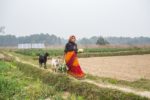
Empowering female farmers through improved access to water technologies
By Manohara Khadka “I wish to have a solar powered irrigation pump (SIP),” said a female farmer from Madhavpatti village in the Parsa district of Nepal’s Province No. 2, “but I don’t know how to access one.” Solar irrigation technology has the potential to empower more than 12 million women…





